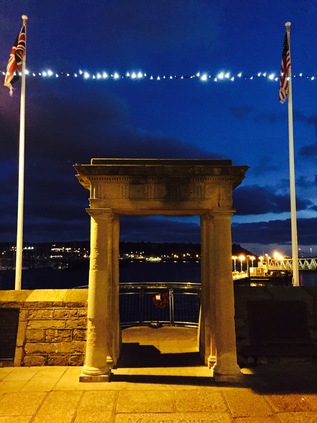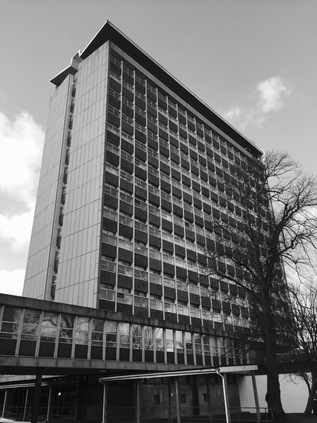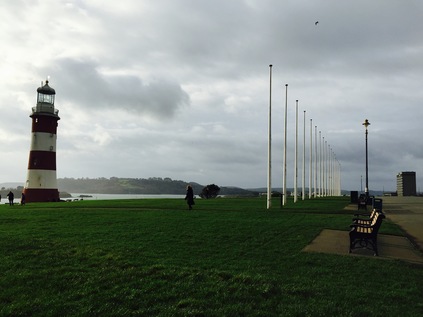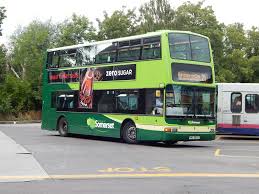Breakfast is by far my favourite meal. There are a number of reasons for this: firstly, it's usually accompanied by copious amounts of coffee. I love coffee. Don't misread this as "Mike likes coffee" - I appreciate it's subtleties and variations, I love the flavour and the ritual of making it, and I drink a ridiculous amount of it. I really like it a lot. Secondly, I'm an early riser - and by the time breakfast comes around, I'm really hungry. So, I don't suffer from the "hmm, I just woke up and I can't face food" thing which many people do. At breakfast time, I'm ready to eat! Finally, and rather simply, breakfast gets all the best foods. While you're probably inserting your own favourite breakfast food here - maybe a glistening link of Cumberland Sausage, a gloriously sticky waffle, a flaky croissant, a crisp edged sliver of back bacon or even a fluffy golden pancake - there's one food that I grew to love and which I feel the need to speak up for - and that is Black Pudding.
I grew up in a Midlands household where three generations of the family were living close together. My great-grandparents had come from farming stock and were certainly not squeamish or sentimental about livestock. My grandparents had survived the hardships of the Second World War too, and didn't believe in wasting food. As a child, I was more than comfortable with the idea that kidneys, pigs feet or chitterlings were being cooked in the kitchen when I arrived home from school. Some of them even smelled pretty good - but I never really tried them. They were 'grown up food' which I imagined I'd discover one day in some greasy-fingered right of passage. Black pudding fell squarely into this category, and stayed there for many years.
Travel broadens the mind in many ways, but for me one of the things it opened up was the joy of breakfast away from home. Perhaps in some lurid, plastic-tableclothed B&B or better yet on a train scudding north - it's hard to beat the travel breakfast. It's here I found myself experimenting with Orange Marmalade for the first time - something we rarely found at home - and it's here too I first tentatively tried black pudding. By turns smoothly unctuous and rather grainy in texture, the rich pork flavours lured me in. It was like the most bacon tasting bacon ever, essence of fried pig. In short, I was hooked. A lot of my travels took me to points north, and I found it easily enough. I remember strolling through Bury Market and seeing a stall entirely devoted to it. It even formed the basis, along with haggis, of one of the best hangover cures I've ever had one fuzzy-headed morning in Anstruther. Suddenly TV chefs were using it too - sliding it under seared scallops as a sort of middle class middle finger to 'poor food'. I could have found some woolly-headed Liberal offence to take here, but I was happy. More black pudding is a good, good thing.
But it's not always that simple. Black pudding has a pretty poor reputation in many quarters - which might be down to that complex class-related issue, or might just be because people don't enjoy the thought of fried pig's blood? Certainly, living as part of a joint UK/US household I've had my own acceptance challenged of what we delicately call 'offal', but what across the pond is known plainly and anti-euphemistically as 'organ meat'. But my position remains that if people taste the stuff, they'll at least decide on rational grounds - and sure enough, this household now has TWO pudding eaters! However, this ambivalence to the stuff causes some very strange things to happen. Firstly, its sudden vogue means it can be found on the menu everywhere - but the generally lack of enthusiasm means it's equally often the first thing to become unavailable. I'll often find my lips smacking at the thought of a slice of glistening, dark savoury pudding only to be told the chef is out of it. Or more strangely still, it appears to be listed as a standard breakfast item but simply doesn't appear. Is the assumption that it's OK to leave the pudding off because people don't like it? Or is it something more sinister? I've noted this and pointed it out as we travel around the country - and I think at first it sounded like I was being over-dramatic or pudding-paranoid, but after yet another non-appearance today I think my conspiracy theory is gaining more general acceptance here. Today's excuse? They are changing the menu but hadn't updated the card yet. But of course because it was 'only the black pudding' it didn't matter at all.
I realise that this is an awfully long tirade about something very, very unimportant. The very definition of the first world problem perhaps. But there is something slightly serious hiding here. The whole North/South divide thing hasn't gone away at all - it lurks in these strange culinary, linguistic and class prejudices which are riven through British life. But please, breakfast chefs of Britain, don't deprive me of this wondrous food on the basis of an amateur semiotic analysis. It tastes good, it's traditionally British and it's pretty darn cheap.
Give me back my Black Pudding!

Heading West: We Ourselves Must Pilgrims Be
Posted in Travel on Wednesday 31st December 2014 at 10:11pm
It's been a long-standing tradition here to escape between Christmas and New Year. There's something about getting back out into the world after a period of staying indoors, eating and drinking which is both refreshing and cathartic. We'd thought about various trips, but as it had been a pretty hectic run up to Christmas, and with the changes around jobs and finances here it wasn't really clear if we'd manage to get away as we'd hoped. Eventually, things resolved themselves and I found a reasonably priced night at a hotel in Plymouth which I'd stayed at once for a First Great Western Customer Panel meeting. It's quite a while since I'd been to Plymouth - aside, that is from passing through on route to Cornwall or very occasionally changing trains here on jaunts around the South West. Since my last visit I'd read a lot more about the Abercrombie planned City Centre and I was keen to visit again. Also, with a tourist's eye I realised that I'd never quite made it to Plymouth Hoe or The Barbican. So, we set off around mid-day on a series of surprisingly quiet trains and in remarkably good weather. A swift change at Taunton, then a dash along the sea wall at Dawlish before cresting the South Devon Banks. It was very good to be back on the rails again.
We arrived and headed straight for the hotel to check-in and deposit our bags. At the head of the long boulevard of Armada Way, our hotel was a strange, concrete-clad example of the strangely dated architecture of the new city centre here. I'd recalled it as a drab, grey corner of the city - but once inside it was warm and clean, if a little dated. Armada Way too was looking a little better - a mixture of some very smart landscaping and some very effective Christmas decorations actually had it looking very bright and welcoming, so we headed out into the city as dusk fell. The long stretches of modernist blocks seemed softened by the silver-grey evening light and it was difficult not to feel comfortable here. Something of a contrast to previous visits. We pressed on through the impromptu fairground, still whirling and blasting ill-advised pop hits, and into the Civic Zone. The towering and ill-fitting Civic Centre, topped by a breathtaking roof sat across from the almost caricatured period-piece law courts and granite-blasted Guildhall. It is an uneasy mix - and not how the plan was meant to turn out of course, but it remains an interesting footnote in British architectural history - and despite being seen often as "how not to do things" all three buildings remain in use today.


After a leisurely dinner and a comfortable night, we set out to explore further. This time we crossed onto the Hoe, ascending to view the vast War Memorial which faces down the city defiantly, aligned on the long axis of Armada Way and elevated. Beyond this, the relocated Eddystone Lighthouse is a reminder of the naval pedigree of the city. As we crested the rise here, the vast sweep of the natural harbour at the mouth of the Tamar was evident. A silvery sky reflected on the water, the near-distance shrouded in rainclouds. It was an atmospheric and stirring view which somehow made complete sense of the city and it's curious alignment. We lingered for awhile before moving off towards the Royal Citadel, skirting it's forbidding stone walls along the waterfront to find our way back to The Barbican.

We set off home in the dark, a cosy train ride north to close our year. The train was quiet and warm, and I reflected on our travels. We hadn't managed to cover nearly the ground we'd hoped this year - but it looked like we could perhaps redress that a little now. As it was though, this trip was a good indication of how things should be - with places seen afresh and explored anew. It was a fitting way to end a tough but rewarding year, and a statement of intent for the next one.

Disintegrating Transport - A Little Victory...
Posted in Updates on Tuesday 16th December 2014 at 9:09am
Regardless of how it might sometimes look, I'm not a public transport advocate. I really don’t worry too much about how other people get around, aside of course from wanting people generally to think about the effect they're having on the rest of the planet wherever they can. It’s true I love rail travel and railways, but that’s more of a passion and an interest than any serious political pursuit. It’s also true that I'll get involved in campaigns about things happening to transport locally, but that’s not really borne of a political agenda – more just a wish to ensure those of us who need transport, still have it to use. My relationship with public transport is far simpler than most people think in fact – I use it because I need it. But having done a stint on the fringes of the transport industry, I can sometimes see inside in ways perhaps others can’t, or where they just can’t be bothered to navigate the arcane syntax and traditions. I can sometimes see how the convoluted, contrary workings of the system misalign and cause unintended problems – most often for us, the users. Because I can generally see how the system has unintentionally conspired rather than been deliberately sabotaged, I'm usually a fairly good natured correspondent with the transport companies. I want people to see the problems I do, acknowledge them and fix them. I rarely want blame or redress. A working transport system is worth much, much more to me than a refund or a half-hearted apology after all.
So, this story begins in October. My wife had just landed an interesting job with huge potential for future developments. The only drawback was that it was on the Blackbrook Business Park in Taunton. It’s easy to get to Taunton from here. A short walk to the station, less than half an hour on the train, and aside from a walk or a quick bus into the centre, you’re pretty much there. Blackbrook is another matter. Situated near the M5 motorway on the eastern outskirts of the town, there is little else there. A strip of office buildings on a road which peters out in fields, where the recession is marked by the physical edge where development stopped in 2007. That said, there are a lot of people working out here now. Blackbrook is served by a fair number of bus routes, but the most frequent is the Park and Ride service which crosses Taunton and calls at the end of Blackbrook Park Avenue. We researched the travel options carefully. I do that sort of thing. Past experience and personal geekiness means that I have a pretty thorough grasp of rail ticketing. Bus ticketing though is a mess of local variations and schemes, and we wanted to be sure we were getting the best deal. The winner was PlusBus - the national scheme that bolts unlimited bus travel on to rail tickets in selected towns and cities. It can be added to a Season Ticket so in essence you need only one ticket to make your entire journey – even to an outpost like Blackbrook. For Londoners or other city-dwellers this might sound odd – they generally have a well-integrated ticketing product (such as Oyster or Orca) that makes all this possible – but out here in the provinces, this is a much more unusual prospect. Experience led me to be a little suspicious that PlusBus might not be accepted on the Park and Ride service – these services are often arranged or contracted via different means. But all seemed fine – no exclusions listed on the national PlusBus site, no mention of it on the Somerset County Council leaflet about the Park and Ride, and on the local First Group website the Park and Ride was treated as just another service. We’d found our solution – but even then I checked with First's customer service team. They agreed it was fine. All went well for the first day, but on day two my wife got the almost inevitable "you can’t use that on here" talk from the driver. I’d prepared her for this. Drivers get used to seeing the same tickets day after day, and are very risk-averse when it comes to accepting things they've not seen before. Ticket fraud is a real problem – and drivers have correctly been trained that the little bits of fraudulent travel here and there add up to more than the big fraudster. So they checked. She persisted and got to work. The next evening however, the driver had consulted with his manager who told him that they didn't accept the ticket. A ridiculous scene ensued where he was prepared to leave a female passenger stranded at a fairly remote, dark location which all but shuts down after 5:30pm. Naturally, we complained. Bitterly – at first to First Group. Their email service didn't even provide acknowledgement or the ever-necessary complaint reference number so I turned to Facebook and Twitter. I was persistent and irritating, continually pointing out how long things had drifted since the issue arose, and how much additional cost we'd racked up. They lost the complaint, asked me to send it again, wanted more details – endless delaying tactics. They always promised a response but none came. Eventually, one of the local Operations Managers messaged me. He had seen the situation developing and wanted to resolve it. Initially I think he was worried that customer services were getting the heat for someone else's problem. It was he said, a feature of the contract with Somerset County Council that they couldn't accept any concessions or special tickets. I pointed out that there were no exclusions listed and he agreed to check for us. I was impressed with this persistence – he really did seem to want to run a decent, integrated service which made sense to passengers. But, a few days later the response from the Council was that they did not want to accept PlusBus on the Park and Ride. He said he would try to get us a refund on the PlusBus part of the ticket as we’d been sold it under false pretences but that was the end of it.
But I was determined it wasn't. Firstly, PlusBus is clear – participating operators have to expressly explain any exceptions, and there were none listed. The Council's information was specific about OAP and Disabled Concessionary Passes not being accepted on the service, but nothing else. I figured that at very least I could get the information situation improved perhaps? I started with an email to Somerset County Council. Again, no response at all. So, I did the thing all disgruntled busybodies everywhere turn to in the end. A Freedom of Information request. I was very, very specific in my questions – a little experience in the Local Authority transport world has taught me that vagueness is the currency and obscurity is the ever-present excuse where FOIs are concerned. I asked a mix of general questions which drilled down to specifics, and I asked about the Council's commitment to sustainability and integration. At least if I couldn't immediately change the situation, I could make their policy look illogical. Most specifically, knowing this was a contracted service, I queried the ticket acceptance arrangements in the contract. You can see the FOI request here. The answer took a long time. They missed the statutory deadline and I was geared up to make a complaint to the Information Commissioner just for the hell of being annoying and persistent when a response rather unexpectedly arrived late on a December afternoon. It was a disarmingly simple response to the main question: the contract didn’t exclude any specific ticket types at all. I decided to make it personal and picked up the 'phone. After a long slog through the automation of the Council's new "improved" switchboard I was finally put through to the Assistant Director responsible for Public Transport. I explained the situation and he agreed they didn’t accept PlusBus tickets, but he'd gladly check on the FOI response for me. I was on hold for a long time. It was after 5pm. I thought I'd been left to hang up and likely not get through again that day... but then he returned. And for the first time in all this ridiculous saga he said “sorry.”
He had checked the contract and I’d been given the correct information in the FOI response. They hadn't ever excluded PlusBus at all. In fact, the Council had novated this contract in an emergency from an earlier one with a poorly performing Operator who didn't participate in the PlusBus scheme at all. Naturally, there had been no consideration of ticketing issues in the urgency of the switch over. Subsequently the contract had been won in competition by First under the same specification. It wasn't a deliberate exclusion – or even an accidental one – it was just a complete failure to have any regard to it. He conceded that they would in fact have to instruct First to accept the ticket. He was kind enough to send an apologetic email confirming this. I printed it and gave my wife a copy to take with her on her travels. Of course he stressed that ticketing is reviewed regularly, with the next such update in January and it "may not stay the same". I read this as Local Authority code for "fine, you caught us, so we'll make it official and stop accepting it." That change will have to be subject to a public consultation however, and I think it would look pretty poor to start refusing a ticket which is rarely used anyway, and which adds to the integration of the network in Taunton. Time will, of course, tell.
Since then, things haven’t been without incident. The message hasn't spread fast through the depot and drivers who have been on leave have continued to question the ticket. The email I supplied has been flashed, scrutinised and questioned on several occasions. One particular driver who had caught the beginning of this saga then been off work for a while tried to pick up where he left off with an aggressive and belligerent morning rant. It was swiftly addressed by our friendly local manager of course – but it shouldn't have happened. In fact, none of this should have happened. Public transport, if it is to be successful at all, needs to be easy to access. That’s not just about low floors and wheelchair spaces – it’s about simple, clear ticketing which makes it easy to know what to buy and when. It's about being able to complete whole journeys with one ticketing product, and it's about linking rail to bus and onwards to good walking environments. Of course, some ardent drivers will ask why they should care about any of this – well, I've some sympathy in the reverse of course, but an affordable, accessible and joined-up transport system will ease the flow and improve safety for everyone.
That's a huge claim for a little victory on ticket acceptance I know, but it's a start.
Lost::MikeGTN
I've had a home on the web for more years than I care to remember, and a few kind souls persuade me it's worth persisting with keeping it updated. This current incarnation of the site is centred around the blog posts which began back in 1999 as 'the daylog' and continued through my travels and tribulations during the following years.
I don't get out and about nearly as much these days, but I do try to record significant events and trips for posterity. You may also have arrived here by following the trail to my former music blog Songs Heard On Fast Trains. That content is preserved here too.


